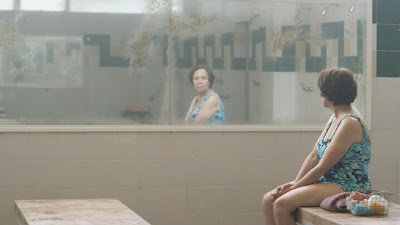What a quiet but engulfing little gem of a film is EVERYTHING ELSE, the new movie from Mexico by writer/director Natalia Almada (shown below). It is not, however, for action aficionados. Not only is there practically no action at all -- our poor heroine cannot even gather the courage to jump into a swimming pool along with the rest of her peers -- even the camera here does not move. From scene to scene, whatever new view it must take in, the camera eye remains utterly stationary throughout.
The cinematographer, Lorenzo Hagerman, keeps his shots clean and pristine, even when the subject matter is often dark and dreary. And when a film boasts a leading actress whose face possesses such character -- longing, suspicion, fear, hope and all the rest -- as does that of Adriana Barraza (shown below and further below), what you have to look at will never, it seems, tire you in the least. Ms Barraza has been utterly terrific in supporting roles in movie after movie -- from Amores Perros and Babel to Henry Poole Is Here, Rage, Drag Me to Hell and especially Cake -- but what a pleasure it is to see her in a leading role, using that marvelous face with such command & subtlety.
Ms Barraza is on screen for most of the movie, with only occasional reaction shots and a bit of dialog given to subsidiary characters. The actress plays a 60-something-year-old government worker, Doña Flor, whose job -- at least it would seem so -- is to prevent citizens (such as the woman shown below) who need some kind of government authorization from actually getting that authorization. (In its own way, the film is quite an indictment of bureaucracy.) Such a stickler Flor is for by-the-letter rules, she uses anything from the color of the ink to the fact that a man's signature is not exactly the same two times in a row (of course: no signature ever is, but she's in charge, so we'll have to let that pass).
The fellow with the incorrect signatures also happens to look and act like an uber-entitled wealthy man, so perhaps something else is going on here, too. Our heroine also keeps a kind of record of violent incidents against women, which we hear reported with regularity via radio and TV over the course of the film.
Doña Flor also lives alone with her cat, and so may also qualify as one of those lonely cat ladies we often hear about. She also swims daily and showers with the other women, though without ever really connecting in any way with anyone. Every scene, every thing in the film is given -- intentionally, I believe -- the same weight, which is certainly one interesting way to define and show us an empty life.
As the movie goes along, after the loss of her only companion, small breaks in Doña Flor's facade begin to appear. And then, slowly, while at work she seems to perhaps listen more closely to the people who appear in front of her for help. She even -- shock! -- begins to bend those rules just a little.
Her journey is a slow and very small one, and yet, thanks to the minute detail that the filmmaker, her star and the supporting cast provide, this journey should prove a vital and important one for viewers looking for character and depth in place of action and special effects. The effects here are of the human and humane variety.
The movie this one most reminded me of is that great but little-seen-over-here Spanish film Le Soledad (Solitary Fragments is its English-language title) by Jaime Rosales, which won Spain's Goya award for Best Film back in 2007. It's been more than a decade since I've seen another Spanish language movie as quiet, austere, elegant and character-driven as that one. So if you want to enter the world of a sad and lonely woman who may still have some possibilities to explore, Everything Else is that opportunity. Snatch it.
From Cinema Tropical, in Spanish with English subtitles and running 98 minutes, the movie opens tomorrow, Friday, May 4, in New York City at the Cinema Village. Elsewhere? I certainly hope so, and if and when I find out where and when, I'll post it here.











No comments:
Post a Comment